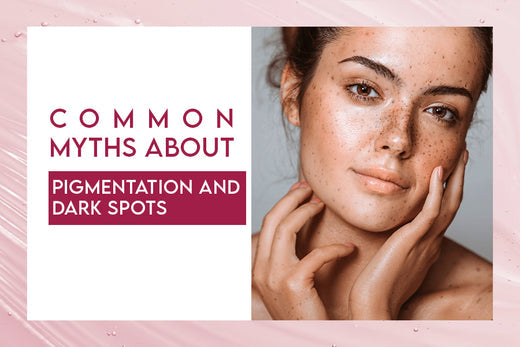
Common Myths About Pigmentation and Dark Spots
|
|
Time to read 3 min
|
|
Time to read 3 min
Table of content
In skincare, a few topics are as misunderstood as pigmentation and dark spots. These common skin concerns often give rise to numerous myths and misconceptions, leaving many individuals puzzled about the best approach to address them. At AVE & YOU, we believe in empowering our users with the knowledge and debunking skincare myths that may hinder their journey toward the healthier, radiant ski
Before diving into the myths, let's clarify what pigmentation and dark spots actually are. The coloring of the skin is referred to as pigmentation, and it is mainly influenced by melanin, a pigment that is made by melanocytes. Dark spots, on the other hand, are localized areas of increased pigmentation, often caused by factors such as sun exposure, hormonal changes, and inflammation.
One common misconception is that dark spots only affect mature skin. While it's true that aging can exacerbate pigmentation issues, dark spots can occur at any age due to various factors like UV exposure, hormonal fluctuations, and genetics. Addressing dark spots early on can prevent them from becoming more pronounced over time.
Dark spots come in different forms and have diverse underlying causes. Some may be the result of sun damage, while others may stem from post-inflammatory hyperpigmentation (PIH) or hormonal imbalances like melasma. Understanding the specific type of dark spots you're dealing with is crucial for choosing the most effective treatment.
While over-the-counter (OTC) skincare products can help improve the appearance of pigmentation and dark spots, they may not provide a permanent solution. Severe pigmentation issues may require professional interventions such as prescription treatments, chemical peels, or laser therapy. Managing expectations and seeking individualized guidance from a dermatologist are crucial.
Sunscreen is often hailed as the ultimate defense against pigmentation and dark spots. However, the need for sun protection extends beyond the sunny summer months. Sun damage can occur all year round due to the ability of UV rays to pass through windows and clouds. Incorporating broad-spectrum sunscreen into your daily skincare routine is crucial for preventing further pigmentation issues.
Gentle Cleansing: Use a mild cleanser that effectively removes impurities without stripping the skin's natural oils. Opt for a formula that cleanses the oilier T-zone effectively while being gentle on the drier areas.
Toning: An alcohol-free toner is key for balancing the skin's pH. Toners are crucial for preparing the skin to better absorb subsequent products, without exacerbating the dry or oily areas.
Moisturizing: Moisturize daily with products that offer hydration without being too heavy. Look for ingredients like hyaluronic acid for hydration and niacinamide for oil control. The goal is to provide adequate moisture to dry areas while not overwhelming the oily zones.
Serums: Incorporate serums that cater to the needs of combination skin, such as those balancing oil production and providing hydration. Lightweight serums with antioxidants are great for overall skin health.
Sun Protection: Daily sunscreen application is essential to protect the skin from UV rays regardless of the skin type.
Eye Creams: Use eye creams specially formulated for the sensitive area around the eyes, which might have different needs compared to the rest of your face.
Body Care: In addition to facial care, pay attention to the rest of your body, especially if the combination skin condition extends beyond the face. Use a gentle body scrub to exfoliate and remove dead skin cells, promoting smoother and more balanced skin. Follow up with a nourishing body oil, which can provide essential hydration without being too heavy, keeping your skin soft and well-moisturized.
Dispelling myths about pigmentation and dark spots is crucial for fostering informed skin care practices. By understanding the nuances of these common skin concerns and debunking misconceptions, individuals can make more educated decisions about their skincare routine. At AVE & YOU , we're committed to providing personalized skincare solutions that celebrate individuality and address specific skincare needs.